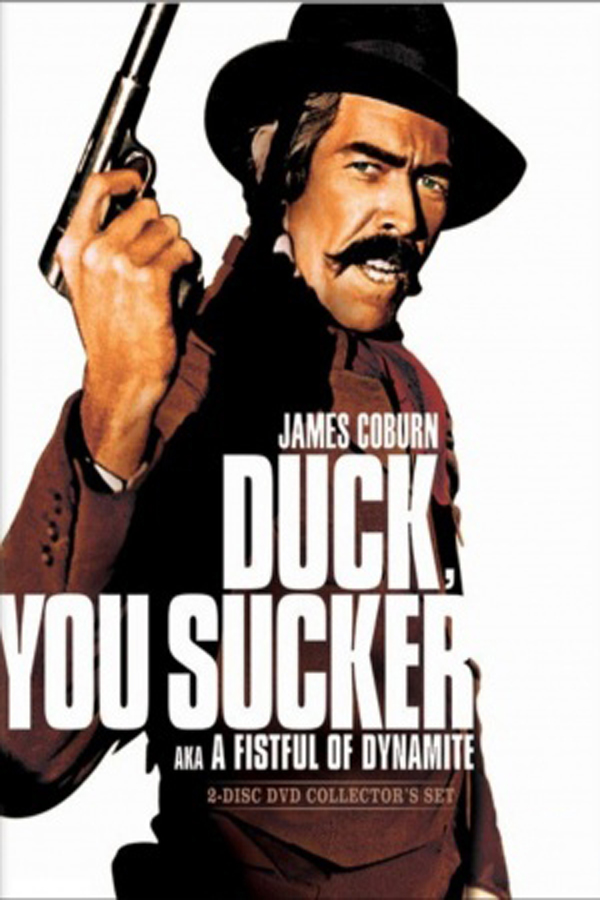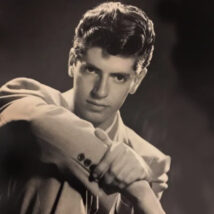Jerry Fielding
Music
A three-time Oscar nominee, Jerry Fielding was among the boldest and most experimental of all Hollywood film composers. His music typically utilized advanced compositional procedures, producing dense, often richly dissonant orchestral textures, sometimes flavored with jazz. Fielding’s film music career was marked by enduring and rewarding collaborations with Sam Peckinpah, Michael Winner and Clint Eastwood.
Born Joshua Feldman in Pittsburgh in 1922 to immigrant Russian parents, Jerry Fielding was brought up in a music-loving but non-musical household. As a home-bound, somewhat sickly teenager, Fielding derived early inspiration from the radio productions of Orson Welles, with their groundbreaking Bernard Herrmann scores. He was also fascinated by the increasingly advanced orchestrations being done for the swing bands of the time, with their heavy reliance on aspects of classical music. The young Fielding joined the studio of Max Adkins, the noted director of theatrical music who also included Henry Mancini and Murray Gerson among his students. After picking up vital arranging skills, Fielding toured with some of the leading dance bands of the 1940s. This led to Hollywood, where his radio and television assignments included conducting and arranging for many of the most popular variety shows of the time, including those of Groucho Marx.
At this time the shadow of McCarthyism was looming over America and Fielding, a self-confessed “loud-mouthed crusader”, found himself among its many victims. His hiring of black musicians for his television orchestra (unheard of in those days) brought criticism and threats. His progressive affiliations brought him to the attention of the FBI and HUAC. Despite his strong liberal beliefs, Fielding said that McCarthy’s men were probably more interested in getting him to name Groucho Marx as a “fellow traveler”. He took the Fifth Amendment and promptly found his Hollywood career in ruins. He eventually found employment in the safe haven of Las Vegas, where he became musical director for the stage shows of Bud Abbott and Lou Costello, Debbie Reynolds, Eddie Fisher and others. He also began recording the first of many pop and swing LPs, such as “Fielding’s Formula”, “Sweet With A Beat” and “Hollywood Brass”.
The approach of the 1960s saw the end of McCarthyism and Fielding’s return to Hollywood. In 1962, at the suggestion of his writer friend Dalton Trumbo, Fielding was hired by Otto Preminger for the film Advise & Consent (1962), a tale of political intrigue amid the halls of Washington, DC. It was a remarkable debut score that combined light orchestral lyricism with hints of the richer, almost ethereal textures of his later work. It was also drenched in Fielding’s own brand of dark irony–a trademark of the composer.
Around this time Fielding, hungry to expand his compositional technique, enrolled as a student of the venerated composer and teacher Mario Castelnuovo-Tedesco, who, incidentally, had given similar instruction to Jerry Goldsmith and John Williams. More television work followed, including scores to Mission: Impossible (1966) and Star Trek: The Original Series (1966). In 1967 Fielding scored Noon Wine (1966), a contemporary western for television directed by Sam Peckinpah. It was the first in a legendary though sometimes tumultuous partnership. In 1969 came The Wild Bunch (1969). This landmark western was Peckinpah’s and Fielding’s breakthrough movie. The composer caught the weariness, dust, dirt and blood of a vanishing West in a rich underscore that interspersed sprightly action cues with wistful Mexican folk melodies and nostalgic, bittersweet dirges. However, as always, the nostalgia was tempered with Fielding’s characteristically steely irony. It earned him his first Oscar nomination. A second came with Peckinpah’s Straw Dogs (1971) in 1971. This controversial though somewhat garbled tale of the violence lurking within a meek man saw Fielding’s music take a new direction. Inspired by Igor Stravinsky’s “Histoire Du Soldat”, and with a large orchestra supplying dense, yearning sound clusters, this remarkable work gives voice to both the characters’ inner turmoil and the desolate Cornish landscapes of the film’s setting.
Fielding provided another sensitive, beautifully forlorn score for Peckinpah’s proxy self-portrait, Bring Me the Head of Alfredo Garcia (1974). However, some Peckinpah collaborations were not so happy. Fielding’s music for The Getaway (1972) was rejected in favor of a score by Quincy Jones. Then in 1973 Fielding backed out of working with Bob Dylan on the score for Pat Garrett & Billy the Kid (1973).
Fielding’s association with Michael Winner began in 1970 with Lawman (1971), for which the composer supplied an epic score tinged with jazz–something of a first for a western! Then followed the searing, impressionistic music for Chato’s Land (1972), The Mechanic (1972) and Scorpio (1973). A standout score was for Winner’s gothic melodrama, The Nightcomers (1971). This gave Fielding a chance to indulge his love of 19th-century baroque music. The composer considered it among his finest works. His final score for Winner was for The Big Sleep (1978). It was an admirable consummation of the composer’s various techniques.
Clint Eastwood was well served by Fielding’s scores to The Enforcer (1976) and The Gauntlet (1977). The composer responded to their hard-edged urban milieu with full-on jazz compositions that featured some of the best jazz players in the business. In 1976 Fielding received his third and final Oscar nomination for Eastwood’s The Outlaw Josey Wales (1976).
Jerry Fielding was a man who fought hard to get his brand of music into films. He was not a glad-hander. He was an uncompromising artist who perhaps sacrificed many choice assignments by spurning easy, producer-friendly routes. These stances may have taken their toll on him. From the mid-’70s onwards, the composer endured a series of heart attacks. In 1980 he suffered a fatal heart seizure while in Canada scoring Funeral Home. He was 57 years old. Jerry Fielding had an innately humane approach to film scoring. He eschewed traditional “mickey-mousing” techniques (i.e., slavishly following every on-screen action). Rather, his music sought to mirror and illuminate the motivations and deepest inner lives of the characters. This it did with great compassion, beauty and sensitivity. Producer Gordon T. Dawson touchingly described Fielding’s music as being ” . . . like a man in a green suit walking in a forest.”
And so it is.

